Related Research Articles

David Roberts was a Scottish painter. He is especially known for The Holy Land, Syria, Idumea, Arabia, Egypt, and Nubia, a prolific series of detailed lithograph prints of Egypt and the Near East that he produced from sketches he made during long tours of the region (1838–1840). These and his large oil paintings of similar subjects made him a prominent Orientalist painter. He was elected as a Royal Academician in 1841.

The Hunterian is a complex of museums located in and operated by the University of Glasgow in Glasgow, Scotland. It is the oldest museum in Scotland. It covers the Hunterian Museum, the Hunterian Art Gallery, the Mackintosh House, the Zoology Museum and the Anatomy Museum, which are all located in various buildings on the main campus of the university in the west end of Glasgow.
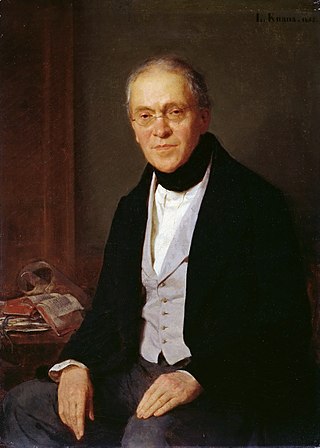
Gustav Friedrich Waagen was a German art historian. His opinions were greatly respected in England, where he was invited to give evidence before the royal commission inquiring into the condition and future of the National Gallery, for which he was a leading candidate to become director. He died on a visit to Copenhagen in 1868.
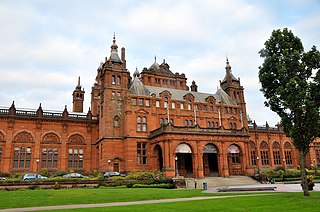
Kelvingrove Art Gallery and Museum is a museum and art gallery in Glasgow, Scotland, managed by Glasgow Museums. The building is located in Kelvingrove Park in the West End of the city, adjacent to Argyle Street. Kelvingrove Art Gallery and Museum is one of Scotland's most popular museums and free visitor attractions.

The West End Festival is an annual festival in the West End of Glasgow, Scotland.

The Theatre Royal is the oldest theatre in Glasgow and the longest running in Scotland. Located at 282 Hope Street, its front door was originally round the corner in Cowcaddens Street. It currently accommodates 1,541 people and is owned by Scottish Opera. The theatre opened in 1867, adopting the name Theatre Royal two years later. It is also the birthplace of Howard & Wyndham Ltd, owners and managers of theatres in Scotland and England until the 1970s, created by its chairman Baillie Michael Simons in 1895. It was Simons who as a cultural entrepreneur of his day also promoted the building of Kelvingrove Art Gallery and Museum and Glasgow's International Exhibitions of 1888 and 1901.
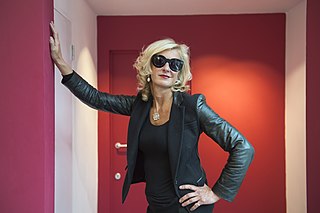
Alison Jackson is an English artist, photographer, and filmmaker. Her work explores the theme of celebrity culture. She makes realistic work of celebrities doing things in private using lookalikes.

Joseph Stanislaus Ostoja-Kotkowski AM, FRSA was best known for his ground-breaking work in chromasonics, laser kinetics and 'sound and image' productions. He earned recognition in Australia and overseas for his pioneering work in laser sound and image technology. His work included painting, photography, film-making, theatre design, fabric design, murals, kinetic and static sculpture, stained glass, vitreous enamel murals, op-collages, computer graphics, and laser art. Ostoja flourished between 1940 and 1994.
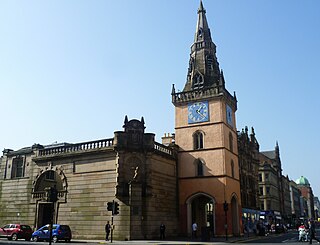
The Tron Theatre is located in Glasgow, Scotland. The theatre was formerly known as the Tron Kirk. It began as the Collegiate Church of Our Lady and St. Anne.

The National Museum of Scotland in Edinburgh, Scotland is a museum of Scottish history and culture.
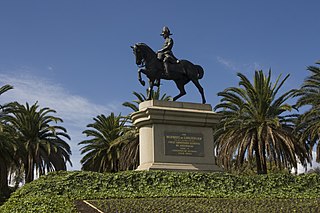
William Birnie Rhind RSA (1853–1933) was a Scottish sculptor.

Tramway is a contemporary visual and performing arts venue located in the Scottish city of Glasgow. Based in a former tram depot in the Pollokshields area of the South Side, it consists of two performance spaces and two galleries, as well as offering facilities for community and artistic projects. The Hidden Gardens is situated behind Tramway. The new extension to Tramway is the home of the Scottish Ballet, and is claimed to be one of the leading venues of its type in Europe.
Glasgow City Centre is the central business district of Glasgow, Scotland. Is bounded by Saltmarket, High Street and Castle Street to the east, The River Clyde to the south and the M8 motorway to its west and north. Glasgow City Centre is composed of the areas of Garnethill, Blythswood Hill and Merchant City as well as parts of Cowcaddens, Townhead, Anderston and Calton.

Graham Fagen is a Scottish artist living and working in Glasgow, Scotland. He has exhibited internationally at the Busan Biennale, South Korea (2004), the Art and Industry Biennial, New Zealand (2004), the Venice Biennale (2003) and represented Scotland at the 56th Venice Biennale in 2015 in a presentation curated and organised by Hospitalfield. In Britain he has exhibited at the Victoria & Albert Museum, Tate Britain and the Institute of Contemporary Arts, London. In 1999 he was invited by the Imperial War Museum, London to work as the Official War Artist for Kosovo.
Paul Friedlander is a light artist who first trained as a physicist. Friedlander obtained a bachelor's degree in Physics and Mathematics at the University of Sussex and was tutored by Sir Anthony Leggett who later was awarded a Nobel Prize for his work on superfluidity. In 1976 he graduated with a B.A. in Fine Art at Exeter College of Art, UK. Friedlander worked as a lighting and stage designer for theatrical productions and avant-garde music before devoting himself to kinetic art at the age of 36. He lives and works in London, United Kingdom (UK).

Dmitry Kawarga born in Moscow, Russia is a Russian artist. Kawarga began working in his own style of "biomorphism" striving to create a synthesis of science, art and technology. His art is featured in numerous museums and is part of the permanent collection of Erarta, Russia's largest private museum of contemporary art located in Saint Petersburg.

Rachel Maclean is a Scottish multi-media artist. She lives and works in Glasgow. She has shown widely in the UK and internationally, in galleries, museums, film festivals and on television. Maclean produces elaborate films and digital prints using extravagant costume, over-the-top make-up, green screen vfx and electronic soundtracks.

Summerhall is an arts complex and events venue in Edinburgh, Scotland. Formerly home to the Royal (Dick) School of Veterinary Studies of the University of Edinburgh, it is now a major Edinburgh Festival Fringe visual and performing arts venue. It also hosts events for the Edinburgh Science Festival and Edinburgh International Magic Festival and provides a home for arts practitioners year round; its many rooms are used for art exhibitions, drama and music performances, libraries, small museums, educational & research programmes, artist studios, arts organisation offices, and workshops.
Kenny Hunter is a Scottish sculptor. He lives and works in Edinburgh. Between 2015 and 2018, he was programme director of sculpture at Edinburgh College of Art where he now continues to work part-time as a lecturer in Fine Art, Sculpture.
References
- ↑ "Eccentric kinematics 'inappropriate' in USSR celebrate 25 years in Glasgow". 29 February 2020.